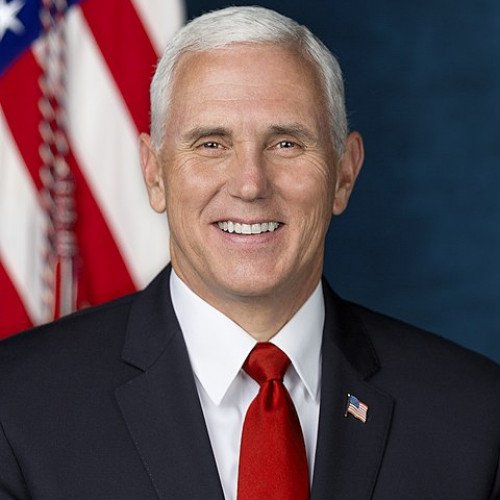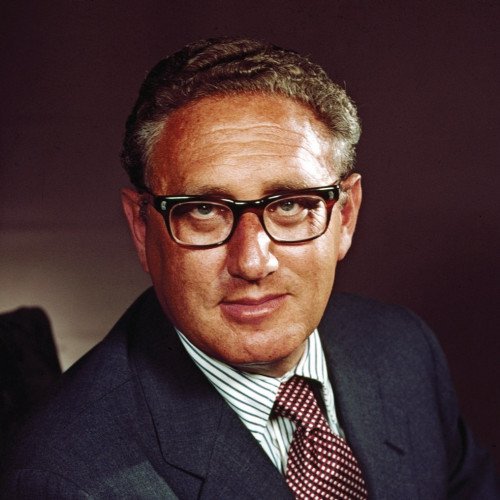Mike Pence VS Henry Kissinger

Mike Pence
Michael Richard Pence (born June 7, 1959) is an American politician who served as the 48th vice president of the United States from 2017 to 2021. A member of the Republican Party, he was the 50th governor of Indiana from 2013 to 2017. Pence was also a member of the U.S. House of Representatives from 2001 to 2013. Pence was born and raised in Columbus, Indiana, and is the younger brother of U.S. representative Greg Pence. He graduated from Hanover College and earned a law degree from the Indiana University Robert H. McKinney School of Law before entering private practice. After losing two bids for a congressional seat in 1988 and 1990, he became a conservative radio and television talk show host from 1994 to 1999. Pence was elected to the U.S. House of Representatives in 2000 and represented Indiana's 2nd and 6th congressional districts from 2001 to 2013. He served as the chairman of the House Republican Conference from 2009 to 2011, the third-highest position in the House Republican leadership. Pence described himself as a "principled conservative" and supporter of the Tea Party movement, saying he was "a Christian, a conservative, and a Republican, in that order."Pence successfully sought the Republican nomination for the 2012 Indiana gubernatorial election when term-limited Mitch Daniels retired. He defeated former Indiana House speaker John R. Gregg in the closest gubernatorial election in 50 years. Upon becoming governor in January 2013, Pence initiated the largest tax cut in Indiana's history and pushed for more funding for private education initiatives. Pence signed bills intended to restrict abortions, including one that prohibited abortions if the reason for the procedure was the fetus's race, gender, or disability. After Pence signed the Religious Freedom Restoration Act, he encountered fierce resistance from moderate members of his party, the business community, and LGBT advocates. The backlash against the RFRA led Pence to amend the bill to prohibit discrimination based on sexual orientation, gender identity, and other criteria. Pence withdrew his gubernatorial reelection campaign in July 2016 to become the running mate of Republican presidential nominee Donald Trump, who went on to win the 2016 presidential election. He was inaugurated as vice president of the United States on January 20, 2017. As vice president, Pence has chaired the National Space Council since it was reestablished in June 2017. In February 2020, Pence was appointed chairman of the White House Coronavirus Task Force, which was established in response to the COVID-19 pandemic in the United States. Pence and Trump lost their bid for re-election in the 2020 United States presidential election to Joe Biden and Kamala Harris, although the Trump campaign refused to concede, made allegations of election fraud, and filed lawsuits in multiple states, most of which have been rejected by the courts. Following the storming of the Capitol by supporters of Trump and despite Trump's urging him to overturn the results, Pence certified the Biden-Harris ticket as the winner of the election. Pence was vilified by Trump and threatened by Trump's supporters for not trying to overturn the election results.
Statistics for this Xoptio

Henry Kissinger
Henry Alfred Kissinger (; German: [ˈkɪsɪŋɐ]; born Heinz Alfred Kissinger; May 27, 1923) is an American politician, diplomat, and geopolitical consultant who served as United States Secretary of State and National Security Advisor under the presidential administrations of Richard Nixon and Gerald Ford. A Jewish refugee who fled Nazi Germany with his family in 1938, he became National Security Advisor in 1969 and U.S. Secretary of State in 1973. For his actions negotiating a ceasefire in Vietnam, Kissinger received the 1973 Nobel Peace Prize under controversial circumstances, with two members of the committee resigning in protest.A practitioner of Realpolitik, Kissinger played a prominent role in United States foreign policy between 1969 and 1977. During this period, he pioneered the policy of détente with the Soviet Union, orchestrated the opening of relations with China, engaged in what became known as shuttle diplomacy in the Middle East to end the Yom Kippur War, and negotiated the Paris Peace Accords, ending American involvement in the Vietnam War. Kissinger has also been associated with such controversial policies as U.S. involvement in the 1973 Chilean military coup, a "green light" to Argentina's military junta for their Dirty War, and U.S. support for Pakistan during the Bangladesh War despite the genocide being perpetrated by his allies. After leaving government, he formed Kissinger Associates, an international geopolitical consulting firm. Kissinger has written over a dozen books on diplomatic history and international relations. Kissinger remains a controversial and polarizing figure in U.S. politics, both condemned as an alleged war criminal by many journalists, political activists, and human rights lawyers, and venerated as a highly effective U.S. Secretary of State by many prominent international relations scholars.